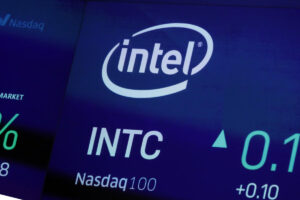Intel (INTC) has recently made headlines as its stock surged by up to 5% in premarket trading, following news reports that rival chipmakers Broadcom (AVGO) and TSMC (TSM) are exploring the possibility of acquiring parts of Intel’s business. The Wall Street Journal revealed that these discussions are focused on splitting Intel into two separate entities, which could potentially revitalize the company amidst ongoing struggles.
According to the report, Broadcom is considering a bid for Intel’s product division, which specializes in designing semiconductors for computers and servers. Meanwhile, TSMC is exploring options to either acquire parts or take full control of Intel’s manufacturing plants, possibly in collaboration with other investors. It’s important to note that these discussions are still in their infancy and have not yet materialized into formal offers.
Interestingly, while shares of Broadcom remained relatively stable, TSMC’s US-listed stock saw a modest uptick of less than 1%. This comes on the heels of a remarkable turnaround for Intel’s stock, which experienced its largest weekly gain since 2000. This rally was fueled by renewed confidence in US support for domestic chip production and reports that TSMC is actively collaborating with Intel to enhance the company’s recovery efforts.
Intel’s manufacturing operations primarily serve its own product lines; however, in 2022, the company debuted a foundry service under then-CEO Pat Gelsinger. This move aimed to diversify its business model by catering to external clients and establishing a competitive foothold against industry giant TSMC. Unfortunately, Intel’s ambitions have not yet borne fruit. The foundry segment has struggled to attract enough outside customers and has been operating at a loss, contributing to significant investor disappointment throughout the past year. After a staggering 60% drop in stock value in 2022, Gelsinger was ousted by Intel’s board in December, reflecting the company’s evolving challenges and strategic shifts.
The interest from both Broadcom and TSMC signals a potentially transformative moment for Intel, which has also attracted acquisition attention from companies like Qualcomm (QCOM), Arm (ARM), and Apollo in recent times. Indeed, Wall Street analysts have suggested that splitting Intel’s operations could unlock significant value for shareholders; Raymond James analyst Srini Pajjuri noted that separating Intel’s product development and foundry business is crucial for the company’s future success.
In line with this, Intel took steps last year to establish a subsidiary for its foundry business, with an eye towards separating its financial operations from its product lines. This strategic pivot has been interpreted by many as laying the groundwork for a possible larger split, although restrictions imposed by US CHIPS Act funding could limit Intel’s ability to enact a complete divestiture of its manufacturing unit.
As these dynamics continue to unfold, investors should stay tuned for updates on the discussions between Intel, Broadcom, and TSMC, as well as any broader implications for the semiconductor industry.

